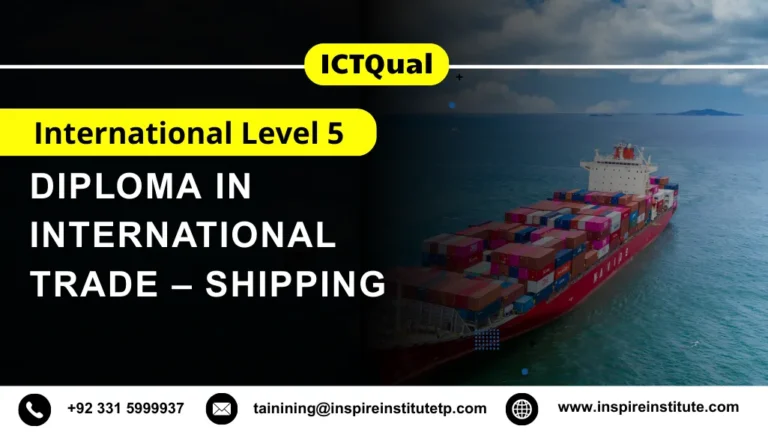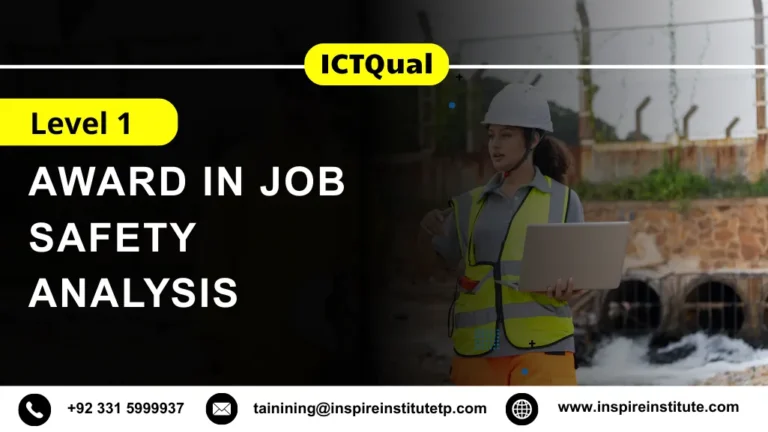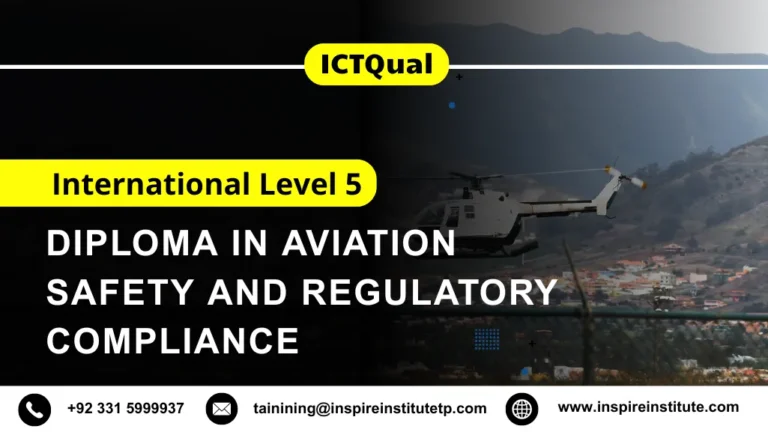ICTQual AB Level 6 International Diploma in Disaster & Emergency Management
The ICTQual AB Level 6 International Diploma in Disaster & Emergency Management is a globally recognized qualification designed for professionals seeking advanced knowledge and practical skills in managing disasters, emergencies, and crisis situations. This comprehensive programme equips learners with the expertise to plan, respond to, and recover from natural, technological, and human-made disasters across various sectors, including government agencies, humanitarian organizations, healthcare, and corporate environments.
The course covers key areas such as risk assessment, disaster preparedness, emergency response planning, crisis management, recovery strategies, and resilience building. Learners gain practical experience through case studies, simulations, applied projects, and scenario-based exercises, preparing them to make effective decisions during high-pressure situations.
Aligned with international standards, this Level 6 diploma prepares professionals for leadership and strategic roles in disaster management. The programme emphasizes proactive planning, operational coordination, safety compliance, and the integration of technology-driven solutions to enhance response effectiveness and minimize risks.
Graduates of this programme will be equipped to develop and implement comprehensive disaster management strategies, coordinate emergency operations, and lead teams in dynamic, high-stakes environments. Completing the ICTQual AB Level 6 International Diploma in Disaster & Emergency Management not only enhances professional credibility but also opens doors to global career opportunities in emergency management, disaster response agencies, risk consultancy, and humanitarian organizations. This qualification empowers learners to become strategic leaders capable of driving preparedness, resilience, and effective response in any emergency or disaster scenario.
Why Choose this Qualification
The ICTQual AB Level 6 International Diploma in Disaster & Emergency Management is a globally recognized qualification that prepares learners to excel in disaster preparedness, emergency response, and crisis management. This programme is designed for professionals seeking to build strategic, operational, and leadership capabilities in high-pressure and dynamic environments.
- Global Recognition: The diploma is internationally accredited, providing learners with professional credibility and recognition worldwide, enhancing career mobility in government agencies, emergency services, humanitarian organizations, and private sector risk management.
- Comprehensive Skill Set: Learners develop advanced competencies in disaster risk assessment, emergency response planning, crisis management, disaster recovery, resilience building, and mitigation strategies across natural, technological, and human-made emergencies.
- Strategic Leadership Development: The course equips learners to take on leadership roles, manage multi-agency coordination, and implement strategic policies for effective disaster preparedness and response.
- Technology-Driven Approach: Gain expertise in integrating technology into emergency management, including early warning systems, crisis simulation tools, data analytics, and resource optimization platforms.
- Industry-Relevant Curriculum: Aligned with international standards and best practices, the programme ensures learners are equipped with the latest knowledge, methodologies, and operational procedures in disaster and emergency management.
- Hands-On Practical Application: Learners engage in scenario-based simulations, applied projects, case studies, and operational exercises that mirror real-world emergency situations, bridging theory and practice.
- Career Advancement Opportunities: Graduates are prepared for senior management, consultancy, and specialist roles within emergency services, disaster response agencies, NGOs, and corporate risk management departments.
- Resilience and Risk Management Expertise: Develop the skills to design and implement risk mitigation strategies, coordinate emergency operations, and lead teams effectively during crises.
- Ethical and Humanitarian Focus: Learn to balance operational efficiency with ethical considerations, humanitarian principles, and community safety during disaster and emergency management.
Choosing this qualification empowers learners to become strategic leaders and decision-makers in disaster and emergency management, capable of implementing effective preparedness, response, and recovery strategies on both national and international levels.
Course Overview
UK based Qualification
Study Units: 36 Units
Evidence & Assignment Based
Course Level: Level 6
Qualification Structure
This qualification, the ICTQual AB Level 6 International Diploma in Disaster & Emergency Management, consists of 36 mandatory units.
Year 1 – Foundations of Disaster & Emergency Management
- Introduction to Disaster and Emergency Management
- Types and Causes of Disasters
- Principles of Risk Assessment and Management
- Emergency Planning and Preparedness
- Crisis Communication and Stakeholder Engagement
- Introduction to Humanitarian Response
- Disaster Legislation, Policies, and Governance
- Environmental Impacts of Disasters
- Resource Management in Emergency Situations
- Introduction to Project Management in Disaster Response
- Health and Safety in Disaster Management
- Ethical Considerations in Emergency Operations
Year 2 – Applied Disaster & Emergency Management Practice
- Advanced Risk Assessment and Vulnerability Analysis
- Disaster Mitigation Strategies
- Emergency Operations and Response Coordination
- Incident Command Systems and Leadership
- Humanitarian Logistics and Supply Chain Management
- Community Preparedness and Awareness Programmes
- Disaster Recovery and Rehabilitation Planning
- Crisis Management for Organisations and Institutions
- Use of Technology and Digital Tools in Disaster Management
- Environmental Sustainability in Disaster Operations
- Applied Research Methods in Disaster Management
- Operational Planning and Simulation Exercises
Year 3 – Strategic Leadership in Disaster & Emergency Management
- Strategic Leadership in Disaster Management
- International Disaster Management Frameworks and Standards
- Policy Development and Regulatory Compliance
- Advanced Crisis and Risk Communication
- Disaster Resilience and Business Continuity Planning
- Climate Change and Disaster Risk Reduction
- Emergency Preparedness for Critical Infrastructure
- Governance, Ethics, and Accountability in Disaster Management
- Innovation and Emerging Technologies in Emergency Response
- Strategic Planning and Resource Mobilisation
- Independent Research Project in Disaster & Emergency Management
- Capstone Project: Applied Disaster & Emergency Management
Who Should Take This Course
This course is designed for professionals, managers, and aspiring leaders who want to gain advanced knowledge and practical skills in disaster preparedness, emergency response, and crisis management. It is ideal for individuals seeking to enhance their careers in public safety, humanitarian operations, and organizational risk management.
- Professionals working in government agencies, emergency services, or disaster response units who aim to move into managerial or leadership roles.
- Risk management and safety officers seeking to develop advanced expertise in disaster preparedness and emergency operations.
- Humanitarian and non-governmental organization (NGO) staff involved in disaster relief, crisis intervention, and emergency coordination.
- Healthcare professionals who play a role in emergency response, hospital disaster planning, or public health crisis management.
- Corporate risk managers and business continuity planners aiming to strengthen their organization’s disaster resilience and response strategies.
- Early-career professionals or recent graduates interested in entering the field of disaster management, emergency services, or humanitarian operations.
- Consultants and advisors specializing in disaster risk reduction, emergency preparedness, and crisis management planning.
- Individuals involved in community safety, civil defence, or emergency preparedness programs seeking internationally recognized credentials.
- Professionals interested in integrating technology, data analytics, and digital solutions into disaster and emergency management operations.
This course equips learners with the expertise, strategic insight, and practical experience required to plan, manage, and lead disaster and emergency operations effectively, preparing them for senior-level roles and global career opportunities in the field.
Certification Route
The ICTQual AB Level 6 International Diploma in Disaster & Emergency Management offers flexible certification routes for both newcomers to the field and experienced professionals. This dual approach ensures learners at all career stages can achieve a globally recognized qualification in disaster preparedness, emergency response, and crisis management.
Route for Learners with No Experience
This route is designed for learners who are new to disaster and emergency management:
- Admission: Learners enrol in the programme at an ICTQual AB Approved Training Centre.
- Training: Learners complete the full three-year, 360-credit programme covering all 36 study units. The curriculum includes theoretical lessons, practical exercises, case studies, and applied projects to provide comprehensive knowledge of disaster and emergency management.
- Assessment: Learners are evaluated through assignments, research projects, simulation exercises, and a final capstone project aligned with the learning outcomes of each unit.
- Certification: Upon successful completion of all assessments, learners are awarded the ICTQual AB Level 6 International Diploma in Disaster & Emergency Management.
Route for Experienced and Competent Candidates
This route is for learners with prior relevant work experience in disaster management, emergency response, or related fields:
- Eligibility: Learners should have a minimum of 6 years of verified experience in disaster management, emergency response, risk management, or related sectors. Experience in supervisory, managerial, or crisis coordination roles is advantageous.
- Assessment of Competence: Learners are assessed to determine whether their existing knowledge and skills meet the programme’s learning outcomes, potentially reducing the need to complete the full three-year programme.
- Evidence Submission: Learners submit documentation of prior work experience, including roles, responsibilities, and tasks aligned with programme outcomes.
- Knowledge and Understanding: Centres ensure learners are familiar with all course learning outcomes. Any skills gaps may be addressed through targeted assignments or applied learning activities.
- Certification: Upon successful verification of competence, learners are awarded the ICTQual AB Level 6 International Diploma in Disaster & Emergency Management without completing the full programme.
This dual-route structure allows learners to either gain comprehensive knowledge through structured training or validate existing expertise, ensuring international recognition in disaster and emergency management.
Eligibility Criteria
To enrol in the ICTQual AB Level 6 International Diploma in Disaster & Emergency Management, learners must meet the following criteria. These requirements ensure that participants are well-prepared to successfully complete the programme and gain advanced knowledge and practical skills in disaster and emergency management:
Minimum Age: Learners must be at least 18 years old at the time of enrolment.
Educational Background: A relevant Level 5 qualification in disaster management, emergency response, risk management, or a related field is preferred. Equivalent professional experience may also be considered.
Professional Experience: Learners with a minimum of 6 years of verified work experience in disaster management, emergency response, crisis coordination, or risk management may qualify through a competency-based route.
Language Proficiency: Learners must have proficiency in English (both written and spoken) to fully engage with course materials, assessments, and practical exercises.
Future Progression
Completing the ICTQual AB Level 6 International Diploma in Disaster & Emergency Management equips learners with globally recognized credentials, advanced knowledge, and practical skills to excel in disaster preparedness, emergency response, and crisis management. This qualification prepares professionals to take on leadership, strategic, and specialist roles across public, private, and humanitarian sectors.
- Senior Management Roles: Graduates can advance to positions such as Emergency Services Manager, Disaster Response Coordinator, Crisis Management Officer, or Risk and Safety Manager.
- Specialized Roles: Opportunities exist in disaster preparedness planning, emergency operations management, risk assessment, and crisis communication.
- Global Career Opportunities: With international recognition, learners can work with government agencies, humanitarian organizations, international NGOs, and multinational corporations involved in disaster management and emergency services.
- Entrepreneurial Opportunities: Professionals can establish consultancy services, emergency planning firms, or risk management agencies that focus on disaster mitigation and crisis response strategies.
- Further Professional Development: Graduates can pursue advanced certifications in areas such as Emergency Management, Disaster Risk Reduction, Crisis Leadership, and Humanitarian Operations.
- Leadership and Strategic Roles: This diploma prepares learners for executive-level positions, including Head of Disaster Management, Director of Emergency Services, or Senior Consultant in crisis management projects.
- Enhanced Professional Credibility: Graduates gain internationally recognized credentials, increasing employability, career progression, and opportunities for global assignments.
- Technology and Innovation Focus: Learners acquire skills to implement early warning systems, digital risk assessment tools, and innovative strategies to improve emergency response and disaster resilience.
By completing this diploma, learners are prepared to lead teams, develop strategic disaster management plans, and implement effective emergency response measures, positioning themselves as influential leaders in the global disaster and emergency management sector.







